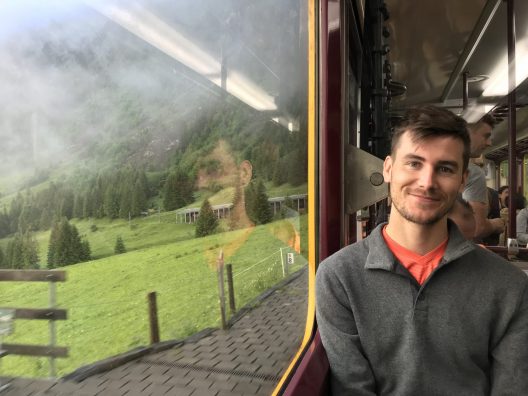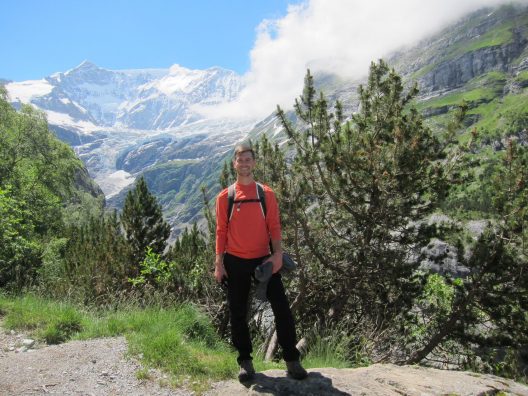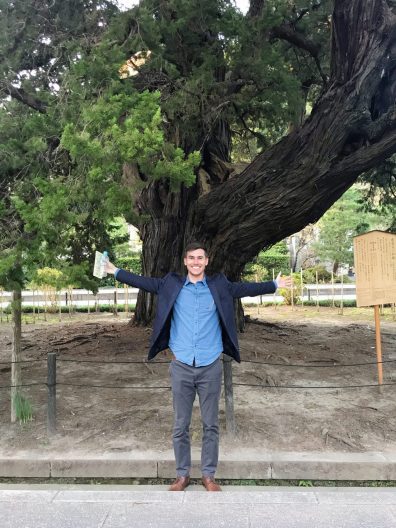Q&A with Greg Papp
Why did you decide to pursue a Master of Marine Affairs?
I’ve always had an interest in the environment and environmental justice, but I was returning to school after 10 years away and thought my undergraduate degree (aerospace engineering) wouldn’t be suited to the biology-intensive environmental programs. Simply, I was nervous about whether there was a spot for me in the environmental science community. SMEA’s MMA was the best balance: it covered so many of the facets of modern environmental decision making (policy, statistics, biological sciences, etc.) housed at a large university where I could delve more deeply into any of those aspects that particularly excited me – which I have since arriving!
Describe your experience in applying to and selecting a graduate program.
This was a major career change for me. I was wrapping up 10 years as a helicopter pilot in the Navy, so there was a lot of serious soul searching mixed into the school and program search. I started by reading professors’ biographies from schools that I was considering and then emailed the ones I thought I best aligned with. Through those conversations, I realized I valued (and needed) breadth of environmental education before settling on a more specific deep dive. SMEA is the perfect place for that. It also helped that UW and SMEA’s staff was far and away the most responsive and friendly.

Photo provided.
How did SMEA first come across your radar? What were your impressions of the program?
My search had two main components: high quality environmental education and work opportunities for my partner (a software engineer). Seattle was an obvious choice, and UW’s College of the Environment is rightfully renowned. I found SMEA through the COE website and immediately was drawn to the interdisciplinary nature of the program. I had been nervous about my lack of undergraduate environmental/biology education but was encouraged by looking through the profiles of the current students: they come from all realms of academia and lived experiences. Now through my first year, I can definitely say that mix of knowledge has made all of my classes more enjoyable and well-rounded. I also value the breadth of the education and variety of experience in the faculty cadre.
Why did you decide to come to UW’s SMEA for graduate school?
Simply, it was the right program in the right place at the right time. The city of Seattle’s long-standing connection to the natural world and problematic history with tribal lands and people create a unique opportunity to learn about, and advocate for, environmental justice. SMEA’s focus on the human dimensions of environmental policymaking is ideal for centering solutions that support the historically exploited and underserved, which is critically important in this time of growing inequality and ever-present climate threats.
Tell us about your Thesis work
I’m looking at how NGOs and global climate funds (like the Special Climate Change Fund, for example) support fisheries in their efforts to adapt and respond to climate change. Specifically, I hope to find out if there’s a gap between what’s being funded and what fisheries and fishery communities actually need to increase adaptive capacity and resilience. This thesis will bring so much of what I’m learning into practice: marine policy analysis, statistics and data analysis, coding in R, international development issues, etc. I’m really excited to apply what I’m learning to a product which I hope will help NGOs improve their project design and, most importantly, benefit fishery communities.

Photo provided.
What has been your favorite class at UW so far? Why?
I’ve most enjoyed all the classes which involve coding in R. I love being able to work with data, make my own maps, or design graphics for a paper. I don’t think I’ve ever had so much fun doing homework!
Tell us about how the COVID-19 pandemic has changed your SMEA experience. What does a daily routine look like for you?
First and foremost, I feel very privileged when answering this question. The pandemic has had such a toll on so many lives, and I want to recognize that privilege and the protections it has afforded me. COVID has been both a good and a bad for my SMEA experience. This was a significant career change for me, and I moved across country (DC to Seattle) during the pandemic so my stress level was high. Having class online helped me ease into the new career as comfortably as I could ever expect: in sweatpants in my own home! All of the professors did a great job converting their classes to the online format and some of them (like the coding-related classes) I think benefitted from the change. On the other hand, I’ve met so many amazing people through SMEA, but only virtually. My cohort is so supportive and smart and talented and I’m sad to have missed out on so many in-person experiences with them – as well as all the pre and post class conversations/lunches/etc. I’m glad we’re all staying safe, and it was the only way to do things, but I still can’t help but feel a little secluded when all our interactions are online. I’m really looking forward to building on those friendships face to face. My daily routine is still forming. In my past life I had long commutes, long hours and multi-month deployments. I’m adjusting to non-Navy life, and COVID obviously threw a wrench in that habit development. During this school year I would usually wake up, eat breakfast and make coffee, go to class, and then get outside. I made it a point to get outside as much as possible, even if just for a short walk. I was privileged enough to spend a lot of time working in my house this past year so I valued that outside time. Online classes also allowed me to have class among the trees in my yard or in parks around Seattle, which was an unexpected bonus.
What assignment, paper, project, or experience has been the most eye-opening for you? Any lightbulb moments in the program so far?
Without a background (academic or lived-experience) in environmental affairs, everything has felt new and exciting. There hasn’t been a single lightbulb moment, but rather an endless string of them! I came into the program wanting to dive in to as much as possible and in return, SMEA has not disappointed. It continues to open my eyes and I’m incredibly grateful for the opportunity to be here and learn from such amazing students and professors.

Photo provided.
What do you like most about SMEA?
I love the breadth of the education. There’s an incredibly broad range of academic expertise and lived experiences in the students and the professors.
What’s it like to live in Seattle? What do you do in your spare time?
I’m hesitant to get too excited yet – I haven’t really gotten the full experience because of COVID, but so far, so good! I’ve spent a lot of time hiking and exploring, as well as just walking around my neighborhood.
If you could design your ultimate job after graduating, what would it be and why?
Good question…tbd!
What is your favorite form of marine life and why?
Probably seabirds (and shorebirds, all birds really). I’m biased because I was a Navy pilot but I just love watching them soar and dive. The ways they’ve adapted to living on the water really fascinate me.